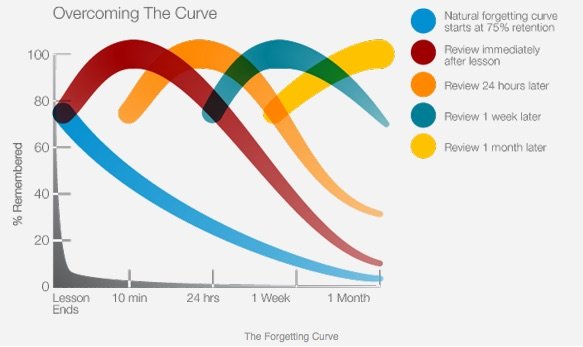You will forget more than 50% of what you learn within an hour and over 2/3rds by the end of the day.
With most medical learning, there is lots of movement and we go through the motions, but by the end of the day there isn’t much there…just like a Zombie.
When I want to learn something new, my usual method is to read journal articles or go to a meeting that covers the topic. Knowledge comes in, has a quick cup of tea and quickly goes out. Then, when I have to report a case around that topic, I find that I have forgotten most of what I have learnt and need to go back to the articles. We have this idea that we should be able to hear or read something, retain it indefinitely and remember it whenever required without any extra effort. This is just not the case.
Current methods of medical learning are predominantly about presenting knowledge through journals and conferences. But learning is not just about acquiring knowledge, its also about retaining and remembering that knowledge when its required. However very little attention or teaching is given to how to retain and remember knowledge. What is the use of spending time, effort and money chasing knowledge, if we forget cant remember it at the time we need to apply it?
How much do we forget:
Hermann Ebbinghaus was a German psychologist in the 1800’s who pioneered work in memory. Through his experiments he had many insights into learning, forgetting and remembering which in a simple form were translated into two curves, the Forgetting and Learning curves.
The Forgetting curve is the most shocking. In his experiments he found that without any extra effort, more than 50% of what we learn is forgotten within an hour, 2/3rd’s by the end of the day and 80% by the end of the month. This is the sad fact when we attend a conference or read an article.
 (Image from lifeinthefastlane.com)
(Image from lifeinthefastlane.com)
Now if someone told you to give them a $100 and by the end of the day, instead of increasing, there would be less than $40 left, would you do it? Wouldn’t you want to do something to ensure that as much of that $100 remains for as long as possible and hopefully increases? So how do we increase our retention and remembrance?
How to learn, retain and remember more:
The Learning Curve: Ebbinghaus looked into how to retain and remember information for longer which formed the basis for his Learning Curve. He found a number of important things that improved retention and remembrance:
-
Practice: The more you do something the better you get at it and the more you remember.
-
Spaced Repetition: Regular intervals where you go over the things you have learnt, dramatically improves your retention and remembrance of information. After learning something new from a journal or conference, have regular intervals where you quickly review what you learnt.
-
Learn things that you have an interest in or need for and can apply. No point going to a CT colonography course if when you get back you don’t see many cases. You will promptly forget it.
The graph below demonstrates the effect of regular repetition and review (spaced repetition) of something that is newly learnt and the dramatic effect that has on how much we can retain and remember information.
(Image from sales activator.com)
Think of the things that you know well, that you report almost automatically. Why is that? Its because you are seeing it all the time, you are constantly practicing and renewing your memory of it and the facts around it. And this is where Ebbinghaus’s theories make practical sense to me. I know from my daily work that the more I do something, the better I get at it, the more I remember about it and the more I learn small facts around that topic in journals and conferences, which increases my overall knowledge of the topic.
Learning is not a one off event, but requires active review and repetition. Learn, practice, and revise at regular intervals for your retention and recall to be much improved.
Image Credit to Canva for Zombie Icon in Header image.
CONTINUE YOUR LEARNING WITH ONLINE RADIOLOGY COURSES. Click on the image below:
What’s the Purpose of the Tuesday Tips? Many of the Tuesday Tip posts arise from questions or difficulties that people bring up in the Mini Fellowships. These posts are meant to be short and concise to answer those questions.
#radedasia
#radedasia #mri #mskmri #radiology

